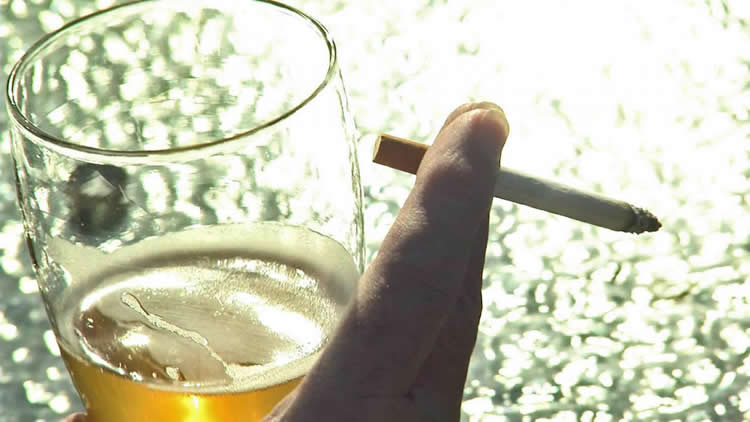Knowledge may help curb alcohol and nicotine addiction.
Alcohol and nicotine use have long been known to go hand in hand. Previous research shows that more than 85 percent of U.S. adults who are alcohol-dependent also are nicotine-dependent. Now, researchers from the University of Missouri School of Medicine have found that nicotine cancels out the sleep-inducing effects of alcohol. It’s a finding that sheds light on the reason alcohol and nicotine usage are so closely linked.
“We know that many people who drink alcohol also use nicotine, but we don’t know why exactly that is,” said Mahesh Thakkar, Ph.D., associate professor and director of research in the MU School of Medicine’s Department of Neurology and lead author of the study. “We have found that nicotine weakens the sleep-inducing effects of alcohol by stimulating a response in an area of the brain known as the basal forebrain. By identifying the reactions that take place when people smoke and drink, we may be able to use this knowledge to help curb alcohol and nicotine addiction.”
Thakkar has been studying the sleep-inducing effects of alcohol and nicotine for more than five years. His previous research has shown that when used in conjunction, nicotine and alcohol increase pleasurable side effects by activating an area of the brain known as the reward center, which can lead to increased alcohol consumption. During the most recent study, rats were fitted with sleep-recording electrodes and given alcohol and nicotine. The researchers found that nicotine acts via the basal forebrain to suppress the sleep-inducing effects of alcohol.
“One of the adverse effects of drinking alcohol is sleepiness,” Thakkar said. “However, when used in conjunction with alcohol, nicotine acts as a stimulant to ward off sleep. If an individual smokes, then he or she is much more likely to consume more alcohol, and vice-versa. They feed off one another.”

Smoking is a major contributing factor to the development of alcoholism. According to the World Health Organization, more than 7 million deaths each year are attributed to alcohol and nicotine use. This research has implications to improve health, not only for heavy drinkers and smokers, but also for individuals with mental health conditions such as schizophrenia, which often is associated with smoking.
Funding: Research reported was supported by the National Institute of Alcohol Abuse and Alcoholism of the National Institutes of Health under the award numbers AA020334 and AA0174720. The content is solely the responsibility of the authors and does not necessarily represent the official views of the National Institutes of Health.
Source: Derek Thompson – University of Missouri
Image Credit: The image is credited to MU Health
Original Research: Abstract for “Nicotine administration in the wake-promoting basal forebrain attenuates sleep-promoting effects of alcohol” by Rishi Sharma, Shafi Lodhi, Pradeep Sahota and Mahesh M. Thakkar in Journal of Neurochemistry. Published online August 31 2015 doi:10.1111/jnc.13219
Abstract
Nicotine administration in the wake-promoting basal forebrain attenuates sleep-promoting effects of alcohol
Nicotine and alcohol co-abuse is highly prevalent, although the underlying causes are unclear. It has been suggested that nicotine enhances pleasurable effects of alcohol while reducing aversive effects. Recently, we reported that nicotine acts via the basal forebrain (BF) to activate nucleus accumbens and increase alcohol consumption. Does nicotine suppress alcohol-induced aversive effects via the BF? We hypothesized that nicotine may act via the BF to suppress sleep-promoting effects of alcohol. To test this hypothesis, adult male Sprague–Dawley rats were implanted with sleep-recording electrodes and bilateral guides targeted toward the BF. Nicotine (75 pmol/500 nL/side) or artificial cerebrospinal fluid (ACSF; 500 nL/side) was microinjected into the BF followed by intragastric alcohol (ACSF + EtOH and NiC + EtOH groups; 3 g/kg) or water (NiC + W and ACSF + W groups; 10 mL/kg) administration. On completion, rats were killed and processed to localize injection sites in the BF. The statistical analysis revealed a significant effect of treatment on sleep-wakefulness. While rats exposed to alcohol (ACSF + EtOH) displayed strong sleep promotion, nicotine pre-treatment in the BF (NiC + EtOH) attenuated alcohol-induced sleep and normalized sleep-wakefulness. These results suggest that nicotine acts via the BF to suppress the aversive, sleep-promoting effects of alcohol, further supporting the role of BF in alcohol-nicotine co-use.
Alcohol and nicotine are highly co-abused. The underlying mechanism is unclear. One reason why people use nicotine, a stimulant, with alcohol is to enhance recreational/pleasurable sensations while suppressing alcohol’s aversive effects such as sleepiness. We have previously observed that nicotine acts via wake-promoting basal forebrain to increase alcohol consumption and activate nucleus accumbens, the pleasure center. Here, we demonstrate that nicotine acts via the basal forebrain to suppress sleep-promoting effects of alcohol further implicating the basal forebrain as a key substrate in nicotine alcohol co-use.
“Nicotine administration in the wake-promoting basal forebrain attenuates sleep-promoting effects of alcohol” by Rishi Sharma, Shafi Lodhi, Pradeep Sahota and Mahesh M. Thakkar in Journal of Neurochemistry. Published online August 31 2015 doi:10.1111/jnc.13219






